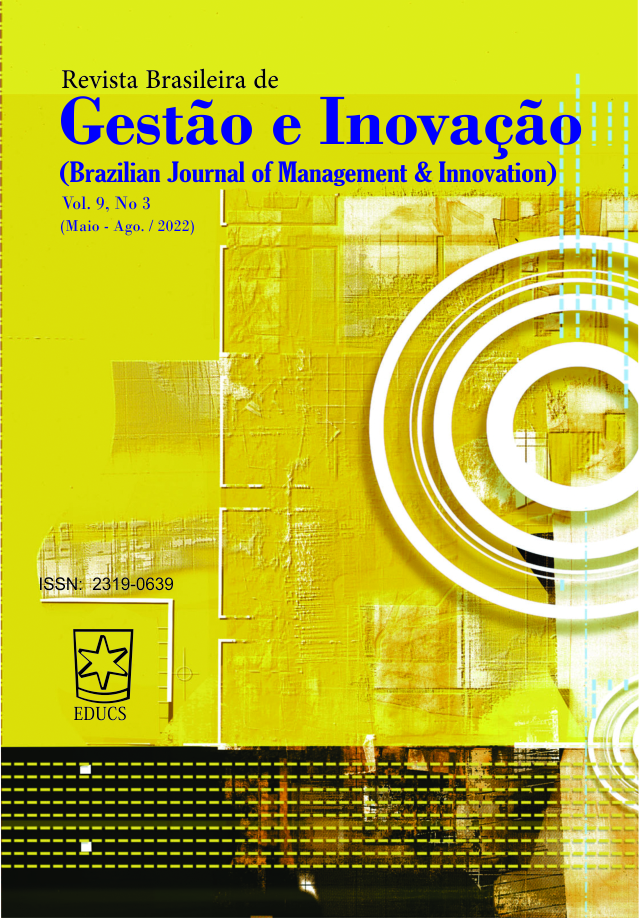DIAGNÓSTICO DEL CAPITAL INSTRUMENTAL DE AREQUIPA COMO CIUDAD EMERGENTE DEL CONOCIMIENTO, 2008 – 2018
DOI:
https://doi.org/10.18226/23190639.v9n3.09Keywords:
Sistema de capitales, Capital instrumental tangible, Capital instrumental intangible, Ciudad Emergente del Conocimiento, ArequipaAbstract
El objetivo del artículo es brindar el diagnóstico del Capital Instrumental de Arequipa afianzado en el perfil cuantitativo y cualitativo de la ciudad; el estudio basa su análisis en las dimensiones de capital instrumental tangible e intangible de la ciudad de Arequipa; galardonada como ciudad emergente del conocimiento. El aporte se evidencia de dos formas: divide el capital instrumental en dimensiones interdependientes que se adaptan al contexto peruano (tanto en el ámbito tangible como en el ámbito intangible) y brinda una escala de clasificación a las dimensiones del capital instrumental, logrando así un diagnóstico de la capacidad tangible e intangible de la ciudad. Para ello, se utilizó la metodología del Sistema de Capitales, la cual asegura la calidad e innovación de los procesos en la Administración del Conocimiento (AC). Los resultados muestran la necesidad de potenciar ciertas dimensiones como: liderazgo empresarial e investigación y desarrollo, en el aspecto intangible para brindar un valor agregado a todas las actividades que en ella se desempeñan. Asimismo, en el aspecto tangible, es necesario implementar mejoras en la conectividad e informatización de la ciudad, el sector agrícola y los espacios de intercambio cultural y de negocios.
DOI: 10.18226/23190639.v9n3.09
Glenn Roberto Arce Larrea*, UNSA - Universidad Nacional de San Agustín de Arequipa, Peru.
Wendy Anne Ugarte Mejía, UNSA - Universidad Nacional de San Agustín de Arequipa, Peru.
Carlos Pedro Vera Ninacondor, UNSA - Universidad Nacional de San Agustín de Arequipa, Peru.
Graciel Anayka Bailon Huayhua, UNSA - Universidad Nacional de San Agustín de Arequipa, Peru.
Carol Rudh Huamani Cotacallapa, UNSA - Universidad Nacional de San Agustín de Arequipa, Peru.
Leidy Fiorela Rodrigo Callo, UNSA - Universidad Nacional de San Agustín de Arequipa, Peru.
Estephany Yrasely Ramos Pacheco, UNSA - Universidad Nacional de San Agustín de Arequipa, Peru.
Angela Daniela Portugal Pacheco UNSA - Universidad Nacional de San Agustín de Arequipa, Peru.
Submetido: Janeiro 2022
Aceito: Abril 22022
*Contato para Correspondência
glenn@unsa.edu.pe
Downloads
Published
How to Cite
Issue
Section
License
Copyright (c) 2022 Brazilian Journal of Management & Innovation

This work is licensed under a Creative Commons Attribution 4.0 International License.
The author must guarantee that:
- there is full consensus among all the coauthors in approving the final version of the document and its submission for publication.
- the work is original, and when the work and/or words from other people were used, they were properly acknowledged.
Plagiarism in all of its forms constitutes an unethical publication behavior and is unacceptable. Revista Brasileira de Gestão e Inovação has the right to use software or any other method of plagiarism detection.
All manuscripts submitted to RBGI - Revista Brasileira de Gestão e Inovação go through plagiarism and self-plagiarism identification. Plagiarism identified during the evaluation process will result in the filing of the submission. In case plagiarism is identified in a manuscript published in the journal, the Editor-in-Chief will conduct a preliminary investigation and, if necessary, will make a retraction.
This journal, following the recommendations of the Open Source movement, provides full open access to its content. By doing this, the authors keep all of their rights allowing Revista Brasileira de Gestão e Inovação to publish and make its articles available to the whole community.
RBGI - Revista Brasileira de Gestão e Inovação content is licensed under a Creative Commons Attribution 4.0 International License.
Any user has the right to:
- Share - copy, download, print or redistribute the material in any medium or format, linking to RBGI site.
- Adapt - remix, transform and build upon the material for any purpose, even commercially.
According to the following terms:
- Attribution - You must give appropriate credit, provide a link to the license, and indicate if changes were made. You may do so in any reasonable manner, but not in any way that suggests the licensor endorses you or your use.
- No additional restrictions - You may not apply legal terms or technological measures that legally restrict others from doing anything that the license permits.
#RBGI







